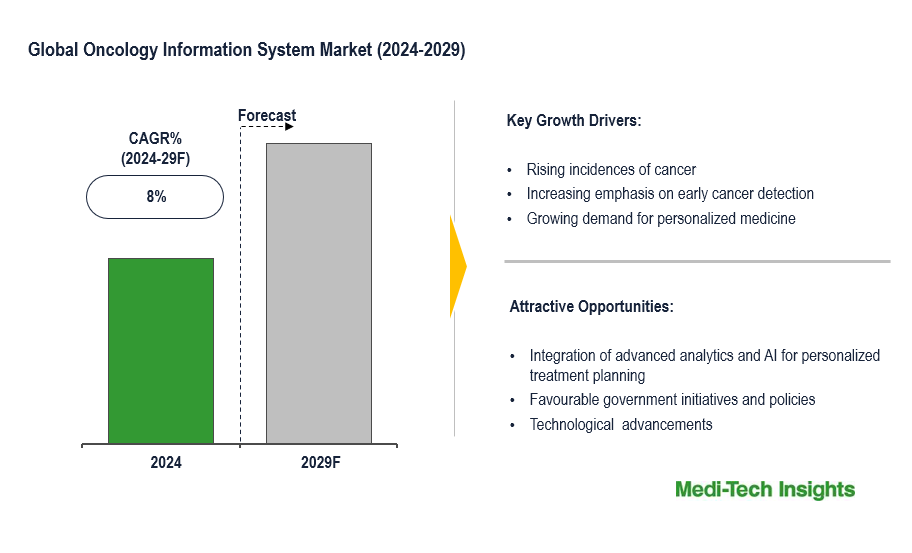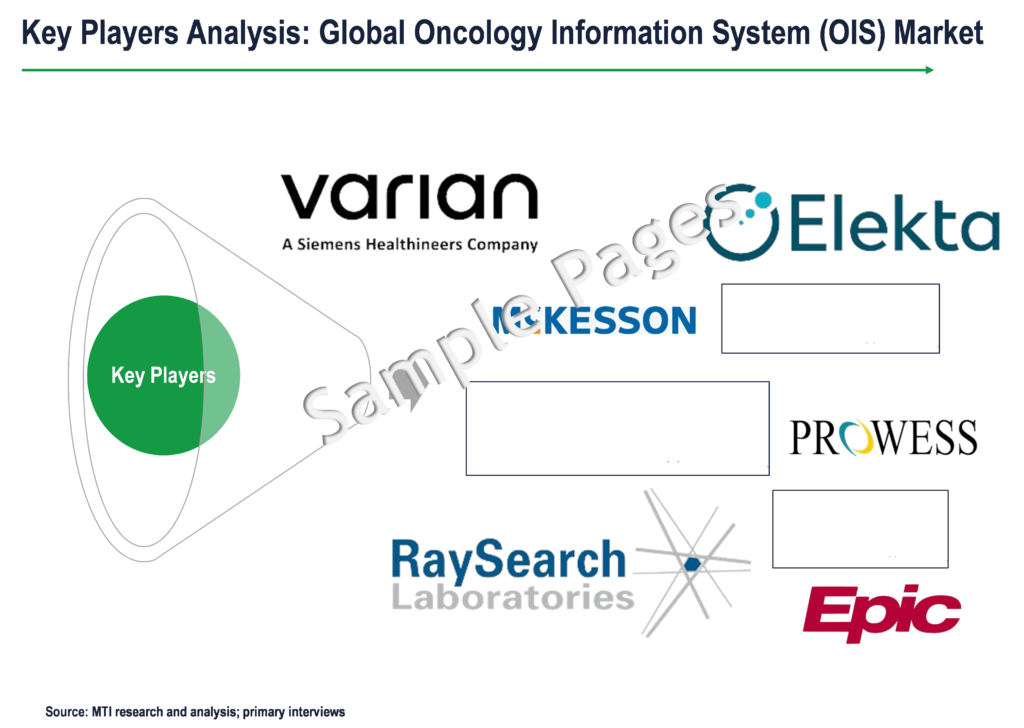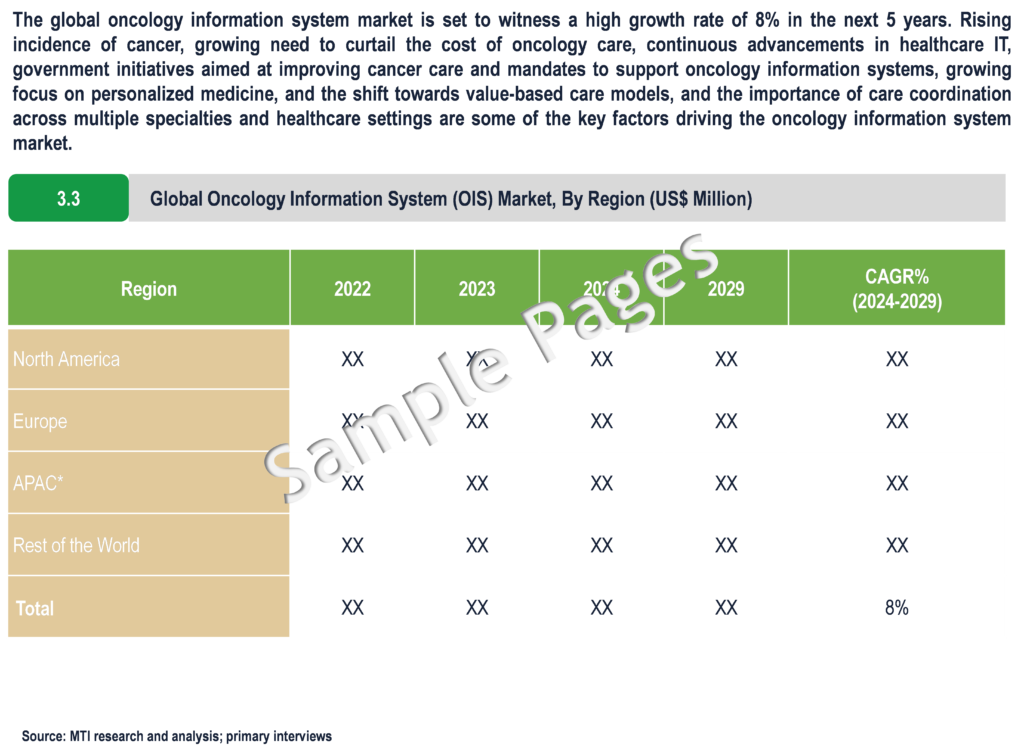
Oncology Information System Market Expected to Witness High Growth of 8% from 2024 to 2029

The global oncology information system market is set to witness a high growth rate of 8% in the next 5 years. Rising incidence of cancer, growing need to curtail the cost of oncology care, continuous advancements in healthcare IT, government initiatives aimed at improving cancer care and mandates to support oncology information systems, growing focus on personalized medicine, and the shift towards value-based care models and the importance of care coordination across multiple specialties and healthcare settings are some of the key factors driving the oncology information system market. To learn more about the research report, download a sample report.
An oncology information system (OIS) is a specialized software platform designed to manage and streamline the workflow and data associated with oncology care and cancer treatment. It encompasses various functionalities tailored to the unique needs of oncology practices, hospitals, and cancer treatment centers. These systems typically include features such as patient scheduling, electronic health records (EHR) specific to oncology, treatment planning and management, chemotherapy administration tracking, billing and coding support, outcome and quality reporting, and integration with other healthcare systems and medical devices. OISs play a crucial role in improving the efficiency, accuracy, and coordination of cancer care delivery while enhancing patient safety and quality outcomes.
Rising incidence of cancer coupled with the need for personalized treatment approach likely to fuel market growth
The increasing incidence of cancer worldwide is putting significant pressure on healthcare systems to effectively manage and treat a growing number of patients. In this regard, oncology information systems help healthcare providers mitigate these challenges by streamlining and optimizing cancer care delivery.
According to the global world health organization (WHO) survey on universal health coverage (UHC) and cancer, in 2022, there were an estimated 20 million new cancer cases and 9.7 million deaths. With the rising number of cancer cases globally, healthcare facilities need robust systems to manage patient information efficiently. Moreover, cancer is a complex disease and the most common treatments include radiotherapy, surgery and chemotherapy, individually or combined. The ideal treatment plan must therefore be personalized for every patient. To handle the complexity and to make sure there are no discontinuities in the handovers between the different health care professionals involved in the care of a patient, clinics use OIS for managing the patient’s data and for analyzing their own operations. OIS can centralize patient records, treatment plans, medication histories, and diagnostic results, enabling healthcare providers to access comprehensive patient data quickly and make informed treatment decisions. OIS provide sophisticated tools for treatment planning and decision support. These systems can analyze patient data, including genetic information and treatment response data, to tailor treatment plans to individual patients. This personalized approach to treatment can lead to better outcomes and reduced side effects, ultimately improving patient satisfaction and reducing the burden on healthcare resources
As cancer diagnoses increase, healthcare facilities must optimize resource allocation to meet the growing demand for oncology services. OIS can help streamline workflows, optimize scheduling, and improve resource utilization by providing real-time visibility into patient appointments, treatment schedules, and resource availability. This enables healthcare providers to maximize efficiency and minimize wait times for patients, ultimately improving patient access to care. OIS capture vast amounts of clinical and administrative data, which can be analyzed to identify trends, patterns, and areas for improvement in cancer care delivery. By leveraging advanced analytics and data visualization tools, healthcare providers can gain valuable insights into disease prevalence, treatment efficacy, resource utilization, and patient outcomes. These insights can inform strategic decision-making, drive quality improvement initiatives, and ultimately improve the overall quality and efficiency of cancer care. Considering these benefits healthcare providers are increasingly turning to oncology information systems to help streamline and optimize cancer care delivery. Hence, the growing incidence of cancer is driving the market for oncology information systems by increasing the demand for tools and technologies that can help healthcare providers effectively manage and treat a larger volume of cancer patients while improving outcomes, optimizing resource utilization, and enhancing the overall quality of care.

To learn more about this report, download the PDF brochure
Key strategies adopted by pharmaceutical manufacturers and CDMOs
Oncology, being complex and data-centric, lacks a universal treatment approach due to the diverse nature of cancers. Personalized treatment plans, often involving radiotherapy, surgery, and chemotherapy, require efficient management through oncology information systems (OIS) in clinics. Software integration is increasingly vital as advancements reshape care management, emphasizing treatment planning and patient engagement. Manufacturers are investing in new product development and expanding geographic reach to meet the growing demand for comprehensive cancer care solutions. Some of the recent developments are listed below-
- In October 2023, Varian Medical Systems Inc. unveiling their next-generation oncology information system at ASTRO 2023. This system is designed to unify data, diverse resources, and expertise across oncology disciplines to empower care teams with a more holistic understanding of their patients and gain deeper insights to deliver more personalized care,
- In September 2023, Varian Medical Systems, Inc., a Siemens Healthineers company, completed the acquisition of Aspekt Solutions, a prominent provider of medical physics, dosimetry, and strategic consultation services. This acquisition enhanced Varian's Advanced Oncology Solutions (AOS) portfolio, enabling the company to better meet the growing need for tailored services and standardized care delivery in the oncology field.
- In July 2023, RaySearch introduced an enhanced edition of its oncology information system, RayCare 2023B. This updated version incorporates integrated management of radiotherapy treatment processes, covering everything from prescription to the evaluation of treatment outcomes. Additionally, it features a new workspace dedicated to treatment course management, facilitating tasks such as organizing fractionation schedules, adjusting treatment settings, and managing approvals.
- In April 2021, Siemens Healthineers AG, acquired of Varian Medical Systems, Inc. with a view to enhance its portfolio in the MedTech sector and address the growing need for personalized, data-driven diagnosis and precision cancer care to address globally increasing cancer rates
North America expected to hold a major share in the oncology information system market
From a geographical perspective, North America holds a major market share of the oncology information systems market. This can be mainly attributed to the highly developed healthcare infrastructure, with advanced facilities and technologies available across the region; high incidence of cancer, contributing to a substantial demand for oncology services and related technologies and stringent regulatory standards governing healthcare practices that influence enhanced technology adoption in healthcare. According to Centers for Disease Control and Prevention (CDC), cancer accounted for 605,213 deaths in 2021 in the US. The prevalence of cancer drives healthcare providers to invest in comprehensive oncology information systems to effectively manage and treat patients. Additionally, the region is a hub for technological innovation and research in healthcare. Technology providers in North America often lead in developing cutting-edge solutions with advanced features, such as integrated treatment planning, imaging capabilities, and data analytics. This innovation drives the adoption of these systems by healthcare organizations seeking advanced tools for cancer care. Moreover, many leading vendors of oncology information systems are based in North America or have a significant presence in the region. This concentration of key market players contributes to the widespread adoption of these solutions in this region.
Irrespective of the challenges such as the high upfront costs associated with implementing oncology information systems, as well as ongoing maintenance expenses; concerns about data security and privacy breaches, leading to hesitancy among healthcare organizations to adopt these systems; issues related to interoperability between different oncology information systems and other healthcare IT platforms ; and resistance from healthcare providers and staff to adopt new technologies and workflows associated with oncology information systems, the global oncology information systems market has high potential to grow at a significant rate and is expected to gain further momentum in the coming years due to a strong emphasis on innovation, and greater acceptance among healthcare providers across the globe. Additionally, the increasing complexity of treatment options and workflows in oncology, highlights the growing demand for AI-powered decision support and workflow management tools among clinicians and clinics. Artificial Intelligence (AI) is likely to have a significant impact on this market as it can by enhance efficiency and precision in cancer care. AI-driven systems analyze vast amounts of patient data, including medical records, imaging scans, and genetic information, to facilitate personalized treatment planning. By leveraging machine learning algorithms, these systems can identify patterns and predict treatment responses, enabling oncologists to make informed decisions and optimize therapy outcomes. Additionally, AI-powered oncology information systems streamline administrative tasks, improve workflow efficiency, and enable seamless integration with other healthcare technologies, ultimately enhancing patient care delivery and driving the adoption of advanced oncology informatics solutions in clinical settings.
Competitive Landscape
The market is marked by the presence of key players such as Elekta Solutions AB (Sweden); Varian Medical Systems, Inc. (A Siemens Healthineers Company) (US); RaySearch Laboratories AB (Sweden); Prowess Inc. (US), Mckesson Corporation (US); Epic Systems Corporation (US); Oracle Corporation (US); and others.

Get a sample report for competitive landscape analysis
Key Strategic Questions Addressed
-
What is the market size & forecast of the oncology information system market?
-
What are historical, present, and forecasted market shares and growth rates of various segments and sub-segments of the oncology information system market?
-
What are the key trends defining the market?
-
What are the major factors impacting the market?
-
What are the opportunities prevailing in the market?
-
Which region has the highest share in the global market? Which region is expected to witness the highest growth rate in the next 5 years?
-
Who are the major players operating in the market?
-
What are the key strategies adopted by players?
- Research Methodology
- Secondary Research
- Primary Research
- Market Estimation
- Bottom-up and Top-down Approach
- Market Forecasting
- Executive Summary
- Market Overview
- Market Dynamics
- Drivers
- Restraints
- Opportunities
- Market Trends
- Industry Speaks
- Opportunity Analysis
- Market Dynamics
- Global Oncology Information System (OIS) Market- Size & Forecast (2023-2028), By Offering
- Software
- Patient Information Systems
- Treatment Planning Systems
- Services
- Software
- Global Oncology Information System (OIS) Market- Size & Forecast (2023-2028), By Application
- Radiation Oncology
- Medical Oncology
- Surgical Oncology
- Other Applications (if any)
- Global Oncology Information System (OIS) Market - Size & Forecast (2023-2028), By End User
- Hospitals
- Diagnostic imaging Centres
- Cancer Care Centres
- Other End Users (if any)
- Global Oncology Information System (OIS) Market - Size & Forecast (2023-2028), By Region
- North America (U.S. & Canada)
- Europe (UK, Germany, France, Italy, Spain, Rest of Europe)
- Asia Pacific (China, India, Japan, Rest of Asia Pacific)
- Rest of the World (Latin America, Middle East & Africa)
- Competitive Landscape
- Key Players and their Competitive Positioning
- Market Share Analysis (2022)
- Segment-wise Player Mapping
- Key Strategies Assessment, By Player (2020-2022)
- New Product Launches
- Partnerships, Agreements, & Collaborations
- Mergers & Acquisitions
- Geographic Expansion
- Key Players and their Competitive Positioning
- Key Companies Scanned (Indicative List)
- Elekta Solutions AB
- Varian Medical Systems, Inc. (A Siemens Healthineers Company)
- RaySearch Laboratories AB
- Prowess Inc.
- McKesson Corporation
- Epic Systems Corporation
- Oracle Corporation
- Flatiron Health (A F. Hoffmann-La Roche Ltd Company)
- MICA Information Systems, Inc.
- CureMD Healthcare
The study has been compiled based on extensive primary and secondary research.
Secondary Research (Indicative List)

Primary Research
To validate research findings (market size & forecasts, market segmentation, market dynamics, competitive landscape, key industry trends, etc.), extensive primary interviews were conducted with both supply and demand-side stakeholders.
Supply Side Stakeholders:
- Senior Management Level: CEOs, Presidents, Vice-Presidents, Directors, Chief Technology Officers, Chief Commercial Officers
- Mid-Management Level: Product Managers, Sales Managers, Brand Managers, R&D Managers, Business Development Managers, Consultants
Demand Side Stakeholders:
- Healthcare Providers, Oncologists, Radiation Oncologists, Radiologists, Nurses and Clinical Staff, Hospital Administrators/IT Heads, Medical Researchers
Breakdown of Primary Interviews

Market Size Estimation
Both ‘Top-Down & Bottom-Up Approaches’ were used to derive market size estimates and forecasts
Data Triangulation
Research findings derived through secondary sources & internal analysis was validated with Primary Interviews, Internal Knowledge Repository and Company’s Sales Data


